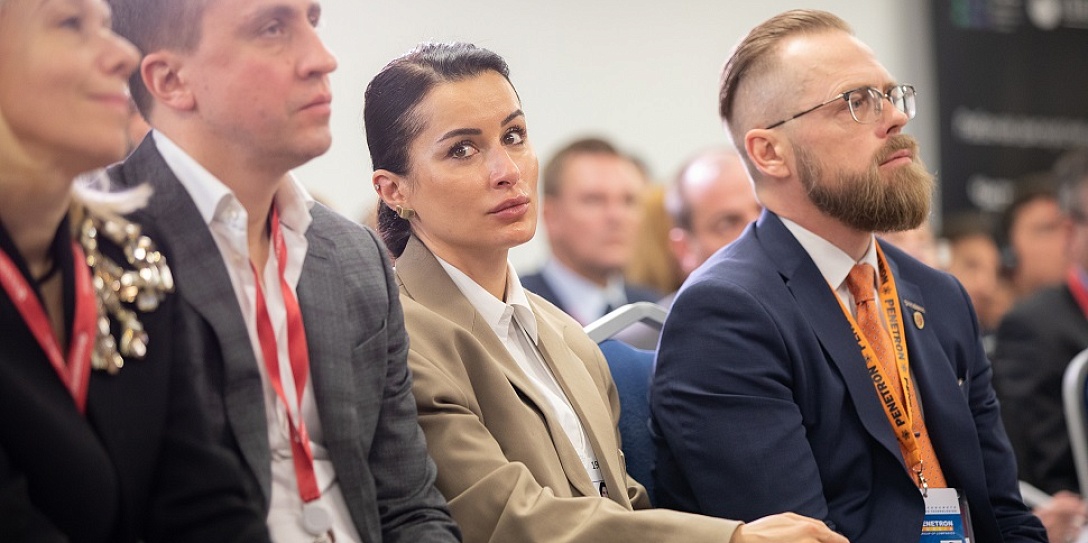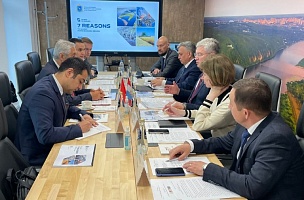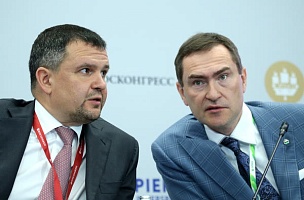KEY OUTCOMES
The cybercrime develops well ahead of the systems to counter it
«We must try rebuilding the world system designed to fight this evil, because we declare the fact that, unfortunately, we are still one step behind», Dmitry Samartsev, Chief Executive Officer, BI.ZONE
«Is there a system today to counter cybercrime? If so, what is it? And if not, how do we develop it? How are we to find ways towards efficiency?» Stanislav Kuznetsov, Deputy Chairman of the Board, PAO Sberbank.
«The situation is unfortunate: currently there is no international system to counter cybercrime and something needs to be done about it», Dmitry Samartsev, Chief Executive Officer, BI.ZONE.
«They feel invincible. Nobody punishes them; the detention of cybercrime groups is a rare phenomenon. Criminals steal money, data, undermine the work of corporations and feel untouchable. It is our reality today», Dmitry Samartsev, Chief Executive Officer, BI.ZONE.
The global economy cybercrime risks exceed the GDP of many countries
«Eight trillion dollars of losses [to cybercrime] by 2022», Stanislav Kuznetsov, Deputy Chairman of the Board, PAO Sberbank.
«A year ago we forecasted a $1 trillion loss to the world economy. Now, it is a fact», Stanislav Kuznetsov, Deputy Chairman of the Board, PAO Sberbank.
«The official financial statements of the Maersk show a loss of more than 300 million dollars in 3 days to the WannaCry virus», Dmitry Samartsev, Chief Executive Officer, BI.ZONE.
Russia, despite the international opinion, is not a cybercrime leader
«We studied hackers from different countries, and Russian hackers are not in the top five, not even top ten. Over the years, the structure changes. At times Turks lead, at other times Chinese, Koreans, Ukrainians, Brazilians», Stanislav Kuznetsov, Deputy Chairman of the Board, PAO Sberbank.
Traditional crime progressively transits over to cyberspace
«Unfortunately, many traditional criminals transit over to cyberspace, those who previously were pickpocketing», Dmitry Samartsev, Chief Executive Officer, BI.ZONE.
Cybercriminals primarily target financial institutions, commercial organizations and individuals
«Generally both across the globe and in Russia, financial institutions and organisations, banks are the primary [cybercrime] targets», Stanislav Kuznetsov, Deputy Chairman of the Board, PAO Sberbank.
ISSUES
Lack of uniform international approaches, mechanisms and institutions to counter cybercrime
«CityGroup operates in about 50 countries, and if they attempt to simultaneously comply with the legislation of all countries of their presence, unfortunately, they would be forced to close down», Dmitry Samartsev, Chief Executive Officer, BI.ZONE.
For various reasons, cybercrime victims often conceal the fact of a cyber attack
«We estimate that at least 80% of all those attacked conceal it», Stanislav Kuznetsov, Deputy Chairman of the Board, PAO Sberbank.
«According to Interpol, less than 1% of hacked, attacked victims report to law enforcement», Stanislav Kuznetsov, Deputy Chairman of the Board, PAO Sberbank.
Outside the sectors exposed to high cyber risks, the counter cybercrime expertise is inadequate
«The main issue today is that all expertise is with large corporate international players such as banks, tech companies, and counter cybercrime companies», Dmitry Samartsev, Chief Executive Officer, BI.ZONE.
«The head doctor of the Tyumen Hospital was conducting neurosurgery when all the equipment shut down as a result of a hacker attack. There was no way to keep the surgery going. We faced missing cyber security protocol in this hospital», Stanislav Kuznetsov, Deputy Chairman of the Board, PAO Sberbank.
In contrast with cybercrime countering systems, cybercrime does not have any state borders and is of extraterritorial nature
«Any cybercriminal today is a global criminal, an international criminal. They use the infrastructure of various countries, they target companies, physical and legal entities in any country, they have no national limits», Stanislav Kuznetsov, Deputy Chairman of the Board, PAO Sberbank.
«And the rules of fighting against these criminals always have national borders», Stanislav Kuznetsov, Deputy Chairman of the Board, PAO Sberbank.
«Today we have deficient international law [to combat cybercrime]», Stanislav Kuznetsov, Deputy Chairman of the Board, PAO Sberbank.
«The introduction of the GDPR (General Data Protection Regulation — European data protection tool) has led to WhoIs service shut down. Today, you need to go to the police to find out who is behind the IP-address. The bureaucracy of international relationships between the police takes months while every minute counts in a cyber attack investigation», Dmitry Samartsev, Chief Executive Officer, BI.ZONE.
The citizens are the primary cybercrime targets
«One of the trends that worries us today is that attacks on the citizens, on individuals, tend to aggravate by at least 15–20% annually», Stanislav Kuznetsov, Deputy Chairman of the Board, PAO Sberbank.
«We found that approximately 96% of our so-called cybercriminals are those who steal money from individuals. Only 3–3.5% are the very hackers who deliberately attack legal entities and only a small number of hackers, no more than 0.5%, develop serious viruses aimed at overriding management of companies, stealing big data and alike», Dmitry Samartsev, Chief Executive Officer, BI.ZONE.
«Unfortunately, teaching cyber hygiene to global citizens is quite a difficult problem to solve at a corporate level», Dmitry Samartsev, Chief Executive Officer, BI.ZONE.
Cybercrime no longer requires computer science expertise or substantial financial resources
«Also, attacks on regular people, on ordinary citizens using social engineering cost nothing. A fraudster does not need to be a skilled hacker or a programmer. They can purchase the necessary tools in the dark web. It can cost anywhere from a few dozens to hundreds of dollars at best», Dmitry Samartsev, Chief Executive Officer, BI.ZONE.
«Russia ranks No.1 internationally in fraud through social engineering», Stanislav Kuznetsov, Deputy Chairman of the Board, PAO Sberbank.
«The cybercrime entry cost should be higher», Dmitry Samartsev, Chief Executive Officer, BI.ZONE.
Cybercrime is already on the verge of cyber terrorism
«We have examples when hackers, trying to take out money, accidentally or not got into air traffic control systems, when critical infrastructure was at stake», Stanislav Kuznetsov, Deputy Chairman of the Board, PAO Sberbank.
SOLUTIONS
Expansion of international cooperation in combating cybercrime
«This year should be a turning point for Russian as well as global companies when we need to learn the principles of information exchange. The sharing of information about cybercriminals is not a business. We must learn to share information with our partners online and use it automatically to train our systems to be more effective in countering cybercriminals», Stanislav Kuznetsov, Deputy Chairman of the Board, PAO Sberbank.
«Through effective collaboration at the level of financial institutions and corporations, it is possible to put up a fairly extensive level of engagement, which will also protect the citizens», Dmitry Samartsev, Chief Executive Officer, BI.ZONE.
«They [corporations] should unite, establish global cyber threats databases, potentially based on the block chain», Alexander Ivanov, founder, Blockchain platform Vostok.
Use the advantages of public-private partnership in combating cybercrime
«We need to bridge law enforcement and the private sector [to ensure cyber security]», Stanislav Kuznetsov, Deputy Chairman of the Board, PAO Sberbank.
«We can collect the evidence database through joint efforts (of private companies) to provide this information to law enforcement agencies», Svetlana Gerbel, Siemens Healthineers.
Information may be used with a mandatory link to the Information and Analytical System of the Roscongress Foundation.






